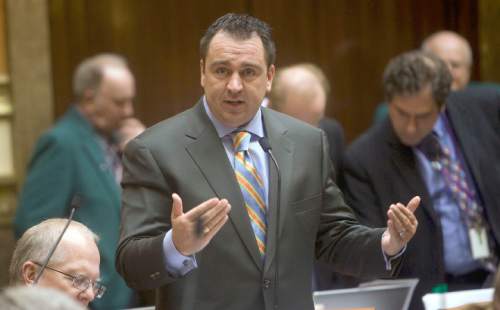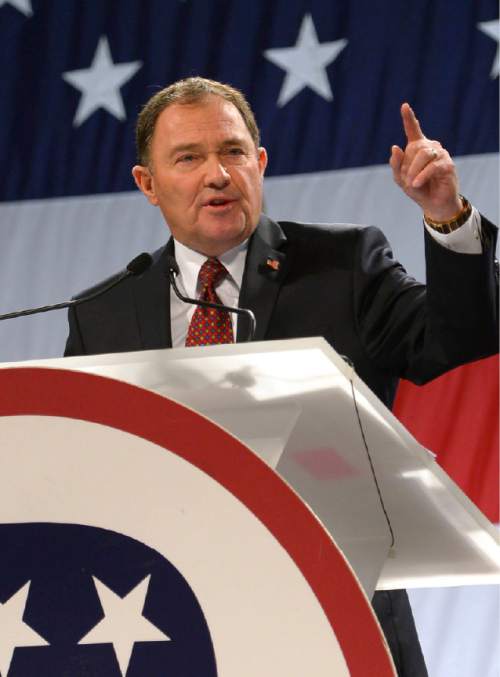This is an archived article that was published on sltrib.com in 2015, and information in the article may be outdated. It is provided only for personal research purposes and may not be reprinted.
Gov. Gary Herbert's plan for expanding Medicaid — Healthy Utah — survived its hearing in the state Senate only to be declared dead on arrival in the House.
In what its sponsor called one of the biggest decisions Utah legislators ever will make, senators voted 17-11 on Wednesday for the plan.
It now goes to the House, where new Speaker Greg Hughes, R-Draper, says SB164 doesn't have the votes to pass.
Hughes said Wednesday there's no point in bringing Healthy Utah to a vote just to kill it. "We're done with the proposal of Healthy Utah," he said, keeping the door open for "a way forward" if someone can come up with an idea that finds support in the House.
Republican House members, who control the chamber by a 63-12 margin, discussed Healthy Utah in two previous closed-door caucus meetings. Hughes emerged from those sessions to say that while no votes had been taken, there was little support for the governor's plan.
Herbert, a fellow Republican, issued a statement Wednesday afternoon condemning House leaders' decision to forgo public debate and voting.
"The decision by House leadership to prevent the representatives of the people from hearing public comment — pro or con — and then voting on such an important issue is alarming and should be of significant concern to citizens across our state," said the governor. "All Utahns deserve transparency and accountability from their elected officials, particularly when their inaction is, by default, a vote to give the federal government $800 million per year of Utah taxpayer money while getting almost nothing in return."
He added that Healthy Utah "deserves the strong consideration and open debate of the full House of Representatives."
House Democratic leader Brian King, from Salt Lake City, also scolded Hughes as "irresponsible" for not allowing SB164 to be heard by the House.
"Any bill that passes the Senate, includes the hard work and effort of the governor, and has the support of the majority of people in our state should most definitely get a fair and full committee hearing," King said in a news release. "The refusal to allow even a committee hearing for the most important matter we have dealt with in years at the Legislature causes me to ask, 'Mr. Speaker, what are you afraid of?' "
In a statement issued Wednesday night, Hughes said "the process is working as it should," with the GOP majority's "lack of enthusiasm," keeping the bill bottled up in the Rules Committee.
"With Critical issues pending and days waning, our time must be dedicated to bills that stand a reasonable chance of advancing through the legislative process, which does not include SB164 as currently constituted," he said.
Healthy Utah is Herbert's prescription to extend Medicaid to 95,000 low-income adults. Sen. Brian Shiozawa, R-Cottonwood Heights, is sponsoring the bill that would enact the plan as a two-year pilot.
"We know how big of a deal this is," Shiozawa, a physician, told his colleagues Wednesday. "This is the best solution for a problem we did not create."
But Sen. Deidre Henderson, R-Spanish Fork, called the bill fiscally irresponsible because it would cost many millions more to continue it in the future.
The governor's office previously estimated it would cost the state $78 million a year in 2021 — if the program were continued — after the federal match falls to 90 percent.
Healthy Utah was initially going to be a permanent program, but the governor's office and Shiozawa scaled it back to a two-year effort to make it more palatable to critics. It could be continued after 2017, but only with legislative reauthorization.
That didn't sit well with Henderson.
"In two years," she said, "we'll have people expecting services to continue."
Sen. Curtis Bramble, however, said Healthy Utah is the best among bad options.
"I wish I could vote against this," the Provo Republican said. "But I've not heard another viable plan that Utah could do."
Senate Minority Leader Gene Davis, D-Salt Lake City, who had previously made an impassioned plea for full Medicaid expansion, was absent for Wednesday's vote.
A few senators changed their votes after a preliminary test Tuesday, when more supported the measure.
— Robert Gehrke contributed to this story.
Twitter: @KristenMoulton





